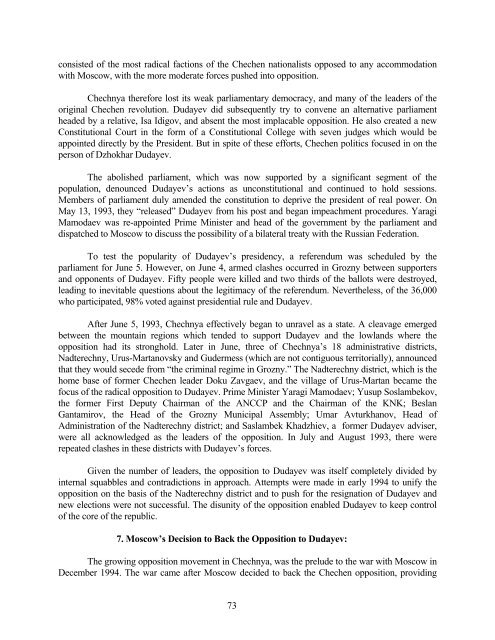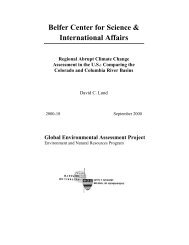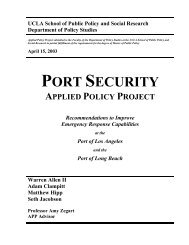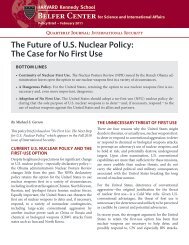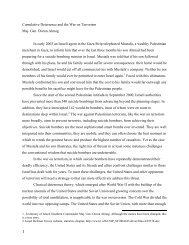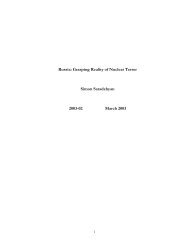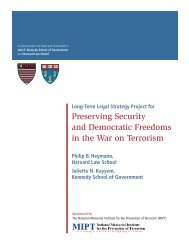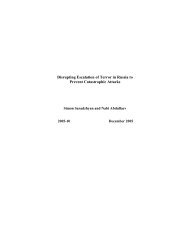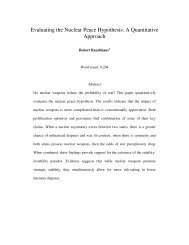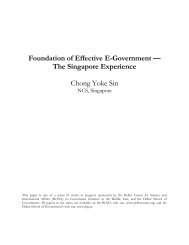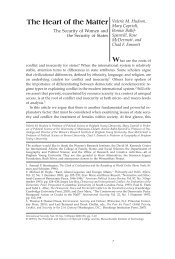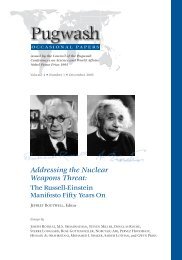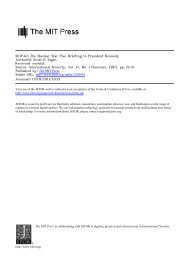RUSSIA'S TINDERBOX - Belfer Center for Science and International ...
RUSSIA'S TINDERBOX - Belfer Center for Science and International ...
RUSSIA'S TINDERBOX - Belfer Center for Science and International ...
You also want an ePaper? Increase the reach of your titles
YUMPU automatically turns print PDFs into web optimized ePapers that Google loves.
consisted of the most radical factions of the Chechen nationalists opposed to any accommodation<br />
with Moscow, with the more moderate <strong>for</strong>ces pushed into opposition.<br />
Chechnya there<strong>for</strong>e lost its weak parliamentary democracy, <strong>and</strong> many of the leaders of the<br />
original Chechen revolution. Dudayev did subsequently try to convene an alternative parliament<br />
headed by a relative, Isa Idigov, <strong>and</strong> absent the most implacable opposition. He also created a new<br />
Constitutional Court in the <strong>for</strong>m of a Constitutional College with seven judges which would be<br />
appointed directly by the President. But in spite of these ef<strong>for</strong>ts, Chechen politics focused in on the<br />
person of Dzhokhar Dudayev.<br />
The abolished parliament, which was now supported by a significant segment of the<br />
population, denounced Dudayev’s actions as unconstitutional <strong>and</strong> continued to hold sessions.<br />
Members of parliament duly amended the constitution to deprive the president of real power. On<br />
May 13, 1993, they “released” Dudayev from his post <strong>and</strong> began impeachment procedures. Yaragi<br />
Mamodaev was re-appointed Prime Minister <strong>and</strong> head of the government by the parliament <strong>and</strong><br />
dispatched to Moscow to discuss the possibility of a bilateral treaty with the Russian Federation.<br />
To test the popularity of Dudayev’s presidency, a referendum was scheduled by the<br />
parliament <strong>for</strong> June 5. However, on June 4, armed clashes occurred in Grozny between supporters<br />
<strong>and</strong> opponents of Dudayev. Fifty people were killed <strong>and</strong> two thirds of the ballots were destroyed,<br />
leading to inevitable questions about the legitimacy of the referendum. Nevertheless, of the 36,000<br />
who participated, 98% voted against presidential rule <strong>and</strong> Dudayev.<br />
After June 5, 1993, Chechnya effectively began to unravel as a state. A cleavage emerged<br />
between the mountain regions which tended to support Dudayev <strong>and</strong> the lowl<strong>and</strong>s where the<br />
opposition had its stronghold. Later in June, three of Chechnya’s 18 administrative districts,<br />
Nadterechny, Urus-Martanovsky <strong>and</strong> Gudermess (which are not contiguous territorially), announced<br />
that they would secede from “the criminal regime in Grozny.” The Nadterechny district, which is the<br />
home base of <strong>for</strong>mer Chechen leader Doku Zavgaev, <strong>and</strong> the village of Urus-Martan became the<br />
focus of the radical opposition to Dudayev. Prime Minister Yaragi Mamodaev; Yusup Soslambekov,<br />
the <strong>for</strong>mer First Deputy Chairman of the ANCCP <strong>and</strong> the Chairman of the KNK; Beslan<br />
Gantamirov, the Head of the Grozny Municipal Assembly; Umar Avturkhanov, Head of<br />
Administration of the Nadterechny district; <strong>and</strong> Saslambek Khadzhiev, a <strong>for</strong>mer Dudayev adviser,<br />
were all acknowledged as the leaders of the opposition. In July <strong>and</strong> August 1993, there were<br />
repeated clashes in these districts with Dudayev’s <strong>for</strong>ces.<br />
Given the number of leaders, the opposition to Dudayev was itself completely divided by<br />
internal squabbles <strong>and</strong> contradictions in approach. Attempts were made in early 1994 to unify the<br />
opposition on the basis of the Nadterechny district <strong>and</strong> to push <strong>for</strong> the resignation of Dudayev <strong>and</strong><br />
new elections were not successful. The disunity of the opposition enabled Dudayev to keep control<br />
of the core of the republic.<br />
7. Moscow’s Decision to Back the Opposition to Dudayev:<br />
The growing opposition movement in Chechnya, was the prelude to the war with Moscow in<br />
December 1994. The war came after Moscow decided to back the Chechen opposition, providing<br />
73


